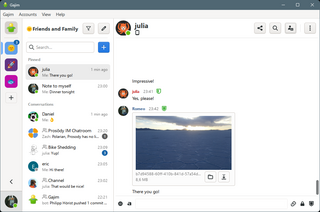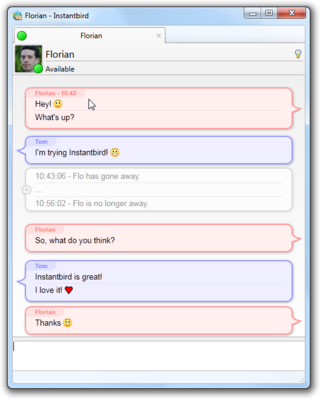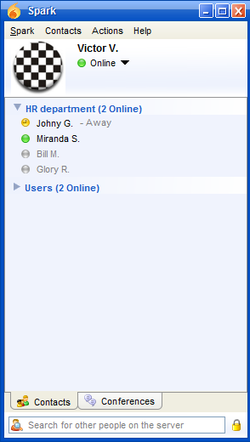
Instant messaging (IM) technology is a type of synchronous computer-mediated communication involving the immediate (real-time) transmission of messages between two or more parties over the Internet or another computer network. Originally involving simple text message exchanges, modern IM applications and services tend to also feature the exchange of multimedia, emojis, file transfer, VoIP, and video chat capabilities.

Pidgin is a free and open-source multi-platform instant messaging client, based on a library named libpurple that has support for many instant messaging protocols, allowing the user to simultaneously log in to various services from a single application, with a single interface for both popular and obsolete protocols, thus avoiding the hassle of having to deal with new software for each device and protocol.
Extensible Messaging and Presence Protocol is an open communication protocol designed for instant messaging (IM), presence information, and contact list maintenance. Based on XML, it enables the near-real-time exchange of structured data between two or more network entities. Designed to be extensible, the protocol offers a multitude of applications beyond traditional IM in the broader realm of message-oriented middleware, including signalling for VoIP, video, file transfer, gaming and other uses.

Miranda NG is an open-source multiprotocol instant messaging application, designed for Microsoft Windows. Miranda NG is free software distributed under the GNU GPL-2.0-or-later.

Psi is a free instant messaging client for the XMPP protocol which uses the Qt toolkit. It runs on Linux, Windows, macOS and OS/2.
HCL Sametime Premium is a client–server application and middleware platform that provides real-time, unified communications and collaboration for enterprises. Those capabilities include presence information, enterprise instant messaging, web conferencing, community collaboration, and telephony capabilities and integration. Currently it is developed and sold by HCL Software, a division of Indian company HCL Technologies, until 2019 by the Lotus Software division of IBM.

ejabberd is an Extensible Messaging and Presence Protocol (XMPP) application server and an MQ Telemetry Transport (MQTT) broker, written mainly in the Erlang programming language. It can run under several Unix-like operating systems such as macOS, Linux, FreeBSD, NetBSD, OpenBSD and OpenSolaris. Additionally, ejabberd can run under Microsoft Windows. The name ejabberd stands for Erlang Jabber Daemon and is written in lowercase only, as is common for daemon software.

Google Talk was an instant messaging service that provided both text and voice communication. The instant messaging service was variously referred to colloquially as Gchat, Gtalk, or Gmessage among its users.
The following is a comparison of instant messaging protocols. It contains basic general information about the protocols.

Gajim is an instant messaging client for the XMPP protocol which uses the GTK toolkit. The name Gajim is a recursive acronym for Gajim's a jabber instant messenger. Gajim runs on Linux, BSD, macOS, and Microsoft Windows. Released under the GPL-3.0-only license, Gajim is free software. A 2009 round-up of similar software on Tom's Hardware found version 0.12.1 "the lightest and fastest jabber IM client".
Off-the-record Messaging (OTR) is a cryptographic protocol that provides encryption for instant messaging conversations. OTR uses a combination of AES symmetric-key algorithm with 128 bits key length, the Diffie–Hellman key exchange with 1536 bits group size, and the SHA-1 hash function. In addition to authentication and encryption, OTR provides forward secrecy and malleable encryption.

Openfire is an instant messaging (IM) and groupchat server for the Extensible Messaging and Presence Protocol (XMPP). It is written in Java and licensed under the Apache License 2.0.

Jitsi is a collection of free and open-source multiplatform voice (VoIP), video conferencing and instant messaging applications for the Web platform, Windows, Linux, macOS, iOS and Android. The Jitsi project began with the Jitsi Desktop. With the growth of WebRTC, the project team focus shifted to the Jitsi Videobridge for allowing web-based multi-party video calling. Later the team added Jitsi Meet, a full video conferencing application that includes web, Android, and iOS clients. Jitsi also operates meet.jit.si, a version of Jitsi Meet hosted by Jitsi for free community use. Other projects include: Jigasi, lib-jitsi-meet, Jidesha, and Jitsi.

Empathy was an instant messaging (IM) and voice over IP (VoIP) client which supported text, voice, video, file transfers, and inter-application communication over various IM communication protocols.

QIP was a multiprotocol instant messaging client. It was a closed source freeware program originally developed by Ilgam Zyulkorneev. In 2008 it was bought by RosBusinessConsulting media group and named most popular RBC service in 2009.

Instantbird is a discontinued cross-platform instant messaging client based on Mozilla's XULRunner and the open-source library libpurple used in Pidgin. Instantbird is free software available under the GNU General Public License. Over 250 add-ons allow user customization of, and addition of, features. On October 18, 2017, Florian Quèze announced that "... we are stopping development of Instantbird as a standalone product."

Movim is a distributed social network built on top of XMPP, a popular open standards communication protocol. Movim is a free and open source software licensed under the AGPL-3.0-or-later license. It can be accessed using existing XMPP clients and Jabber accounts.

Matrix is an open standard and communication protocol for real-time communication. It aims to make real-time communication work seamlessly between different service providers, in the way that standard Simple Mail Transfer Protocol email currently does for store-and-forward email service, by allowing users with accounts at one communications service provider to communicate with users of a different service provider via online chat, voice over IP, and videotelephony. It therefore serves a similar purpose to protocols like XMPP, but is not based on any existing communication protocol.

OMEMO is an extension to the Extensible Messaging and Presence Protocol (XMPP) for multi-client end-to-end encryption developed by Andreas Straub. According to Straub, OMEMO uses the Double Ratchet Algorithm "to provide multi-end to multi-end encryption, allowing messages to be synchronized securely across multiple clients, even if some of them are offline". The name "OMEMO" is a recursive acronym for "OMEMO Multi-End Message and Object Encryption". It is an open standard based on the Double Ratchet Algorithm and the Personal Eventing Protocol . OMEMO offers future and forward secrecy and deniability with message synchronization and offline delivery.

Conversations is a free software, instant messaging client application software for Android. It is largely based on recognized open standards such as the Extensible Messaging and Presence Protocol (XMPP) and Transport Layer Security (TLS).















